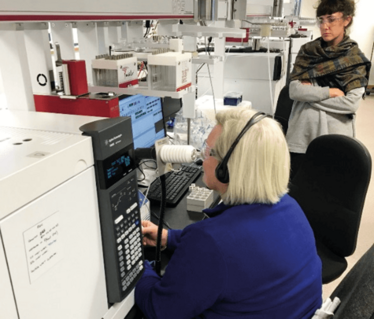Sniffing Out a Test for Parkinson’s
A British woman who can identify people with Parkinson’s disease by smell alone is helping scientists pinpoint the molecules behind the giveaway scent
Joy Milne has an unusual gift. Years before her husband was diagnosed with Parkinson’s disease, Milne started to notice a strange “musky” smell around him. When they later attended a support group for the disease, she realized that the odor was unique to people with Parkinson’s – and the more advanced the disease, the more pronounced the scent.
Milne, a former nurse, attracted widespread press coverage when she proved her “superpower” in a series of controlled lab tests, where she correctly identified clothing worn by Parkinson’s patients versus controls. Her only misstep was to identify one “control” as having Parkinson’s – initially recorded as a false positive, the subject went on to be diagnosed with the disease soon afterwards. Now, Milne is working with scientists who hope to develop a much-needed early test for Parkinson’s disease.

Manchester University chemist Perdita Barran, who appeared in our 2016 Power List, is attempting to isolate the molecules that make up the distinctive odor, which appears to originate in sebum. Changes to sebum production in Parkinson’s sufferers are well known, with many patients reporting “waxy” skin as a symptom.
The team used dynamic headspace sampling to collect volatile compounds from clothing worn by people with and without Parkinson’s. An olfactory detection port (ODP; Gerstel), allowed the samples to be simultaneously analyzed by the human nose (in this case, Milne) and GC-MS. By tallying Milne’s reactions with the read-out from the GC-MS, the researchers have so far identified 10 potential biomarkers that appear to be distinctive to Parkinson’s patients.
Milne is delighted with the initial findings, and hopes that by helping to develop a test she can spare others the pain of watching a loved one struggle with Parkinson’s – her husband died in 2015, 20 years after being diagnosed with the disease. She told the BBC, “It’s horrible watching your partner change like that. If we can get the test right, it may never get to that stage” (1).
Barran added, “It is very humbling as a mere measurement scientist to help find some signature molecules to diagnose Parkinson’s.”
- E Quigley, “Scientists sniff out Parkinson’s disease smell”, Available at: ttp://www.bbc.co.uk/news/uk-scotland-42252411. Accessed January 8, 2018.















